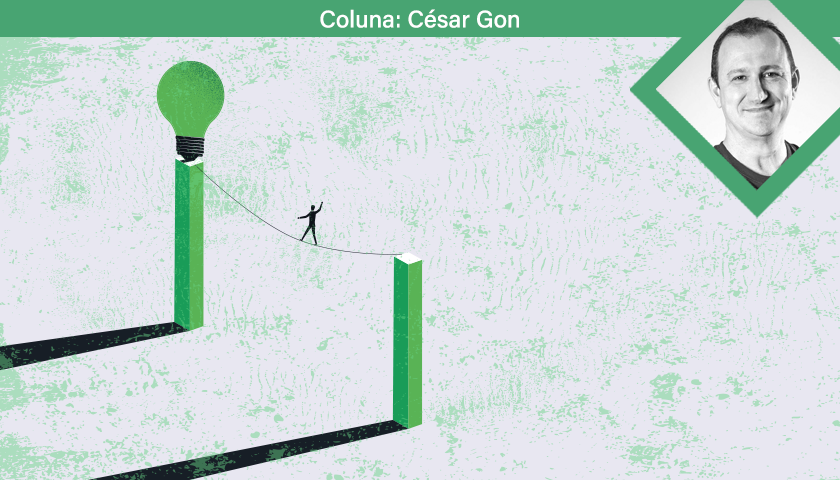
The great enemy of innovation
In an unstable and fearful business universe, courageous leaders bet on innovation and do not follow the primer that success comes out of nowhere, without crises and adaptations

"César, the greatest enemy of human beings is fear". This was the answer of Alejandro Vigil, winemaker of the bodega 'Casa El Enemigo', when I asked him about the origin of the curious name of his winery, during a dinner in Mendoza.
Vigil became famous in the wine world when Robert Parker, the powerful and controversial critic, rated his 2013 vintage at 100 points. Inspired by Vigil, I invite you, with or without a glass of wine in hand, to reflect on what I consider to be the biggest inhibitor of innovation in the corporate environment: the fear.
The infallible leader
In the business world, success is generally seen from an immediate perspective, as if great insight followed by flawless execution were the magic recipe for innovation and instant success. We will then challenge this simplistic view and explore another perspective, evading the "insight + execution" narrative and looking for the real foundations of a victorious trajectory.
When you dive into each of those journeys, the findings are very valuable: removing the mask of infallibility, the true stories of the "powerful" entrepreneurs and CEOs are always marked by crises, mistakes, hard learning and changes. Furthermore, they are not individual stories, but totally collective constructions, which end up symbolized in the figure of a leader. In fact, in a world where the best teams win the game, this personification of business success is, as my grandmother would say, "a stupid craze from the last century".
Resilience, adaptability and courage
By definition, entrepreneurship is a plunge into uncertainty, a bet on resilience, adaptability and the courage to face the unknown. Resilience of values, and of purpose, to always have an immutable "WHY". Adaptability of dreams, strategy, perspectives, to be able to win collectively, to attract, give time and voice to talented people, to co-create and co-destroy "WHAT & HOW", when and as often as necessary. And the third element common to innovative trajectories is courage. Yes, let's talk about courage, but first I need to talk about its antithesis, the fear.
Fear and psychological safety
One of the greatest human catastrophes in the exercise of leadership is that fear of leadership generates leadership through fear. It is insecurity generating oppression, it is the fear of failure, inhibiting sincere interaction between people, maintaining an illusion of control through punishments, making everyone afraid of also failing and losing their jobs. This promotes cowardly habits and alienates those who are creative, talented, intrepid. This environment is the infertile soil for innovation, however talented the professionals may be.
In all my professional trajectory, all the low-performance teams that I ran into, had a fear-based leadership as a common trait. And, what is encouraging, I also saw, most of them, become high performance teams, sometimes with exactly the same people, when they were exposed to a leadership capable of creating a respectful and safe environment; an environment where everyone has a voice and knows they will be supported when they try and eventually fail.
The results of the celebrated "Aristotle Project", a study carried out by Google over two years with 180 teams, highlight how decisive psychological safety is in the performance of a team.
Basically, this research reinforces conclusions from previous studies, with emphasis on the one carried out by MIT professors, Edgar Schein and Warren Bennis, on the need for psychological safety to deal with anxieties generated by an environment of uncertainty (from the perspective of organizational changes). For more details, see "Personal and Organizational Change through Group Methods: The Laboratory Approach" (Schein, E.H. & Bennis, 1965) e “The five keys to a successful Google team” (Julia Rozovsky, 2015).
Uncertainty is the mainstay of this beginning of the third decade of the 21st century, making this theme radically relevant and contemporary. In this context, it is not difficult to conclude that without psychological safety, there will be no innovation in scale in an organization and, therefore, there will be no success in the long run.
Courageous leadership generates secure superteams
If the missing link of innovation is courageous leadership, how can we guarantee the preponderance of this leadership style in our organizations? Or, from another perspective, where should leaders take their own psychological safety to be courageous and form safe and innovative super times?
Well, this is when we are faced with the greatest responsibility of the CEO and the main leaders of an organization: to create and to preserve a corporate culture focused on innovation. It is the true foundation for long-term success, it is the best source for entrepreneurial boldness, to foster an environment addicted to change. It is the culture where leaders form increasingly courageous, more entrepreneurial leaders.
A culture that can also be seen as a safety net: we can try many things and when our hypotheses, plans or processes fail, an invisible giant hand appears to - not only prevent a painful fall - but also to bring us back, to stand, to try again, to learn again, to evolve not only as individuals, but also as an organization.
This is an inescapable responsibility of top leadership, as culture is always a reflection of top leadership. Over the past few years, I have studied senior leadership and CEOs of large companies around the world, from the perspective of digital transformation, culture and the challenges of competing in the 21st century. And I almost always see a mixture of euphoria (for the opportunities) and fear (for the level of uncertainty and depth of the necessary changes).
My thesis is that the biggest challenge for all of us - leaders - is an individual reflection on the personal changes necessary to promote the great transformations we aim for our companies. Or, if we want to use Leo Tolstoy's wise pen, "everyone thinks about changing the world, but nobody thinks about changing him/herself".
And it was reflecting on my own challenges that I remembered that sentence about fear and the intrepid trajectory of Vigil (who is also the chief winemaker of the iconic Catena Zapata) - innovating in the conservative and serious world of wine - who also lives an era of great and profound transformations.
A toast to the courageous leader.

Cesar Gon
Cesar Gon is an entrepreneur in the tech/digital space. He taught himself computer programming by the age of 11, and at 13 sold the code of a chess game to a tech magazine. At the age of 23, he founded CI&T, a pioneering digital service company to help large enterprises make shifts at scale, connecting business outcomes with technology solutions. Under his leadership as CEO, the company achieved 25 years of consecutive growth and global expansion. Gon is a Computer Engineer, with a masters degree in Computer Science from the State University of Campinas. He is also an active investor in venture funds and startups. In 2019 he was awarded EY Entrepreneur Of The Year™ in Brazil. Has three children, loves tech, lean, wines, cigars and football.